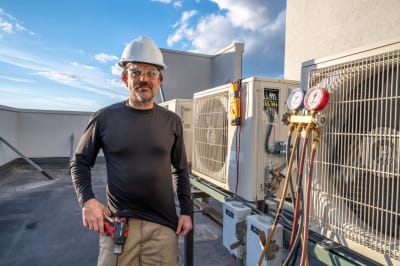Not only are plumbers responsible for fixing and upgrading our drainage and water supply systems, but they are also responsible for designing these systems no matter how complex they get. The ability to adapt their designs to different conditions and scale them to serve more people without losing effectiveness is one thing that plumbers learn in a training school before they can practice professionally.
If you would like to consider becoming a plumber in Denver, Colorado, this is how you must begin. To that end, we have listed below several of the best and most notable plumber training schools in and around Denver, along with a short note on the steps you’ll need to get started.
How to Become a Plumber in Denver
Plumbers in Denver can get started by enrolling in a trade school/college program, completing an apprenticeship program, or going through a fast-tracked program. All of these have benefits, but their purpose remains the same - to give professionals the training they need to do their jobs at a high level.
Individuals must already have a high school diploma or GED to qualify for these programs.
Once they graduate, plumbers in Denver must obtain a residential license, which will allow them to work in a professional capacity. With two years of experience, they may apply to become a journeyman plumber and then a master plumber after two more years.
Top Plumbing Technician Schools in Denver, Colorado
Now that we’ve highlighted the broad steps involved in becoming a plumber in Denver, here are some of the most notable training programs to consider.
Emily Griffith Technical School
Denver, CO Online + Campus
Emily Griffith Technical School is an accredited institution in Denver, Colorado, founded in 1916. The school is responsible for training students in several fields, including plumbing, which remains one of the best training programs that the school has.
Tuition
$1,610 - $6,700Contact
(720) 423-4700
admissions@emilygriffith.edu
Red Rocks Community College
Denver, CO Online + Campus
Established in 1969 and part of the Colorado Community College System, Red Rocks Community College offers a certificate program to prepare students for entry-level plumbing employment. The program consists of a total of 18.5 credit hours.
Tuition
$4,471 - $16,135Contact
(303) 914-6600
admissions@rrcc.edu
Construction Industry of Colorado Training
Denver, CO Campus Only
The Construction Industry of Colorado Training Council (CITC) was established in 1988. Their mission was to provide skill training for five trade associations, including plumbers. That very mission remains paramount to this day.
Tuition
FreeContact
(303) 893-1500
info@citcinc.org
Western States College of Construction
Denver, CO Campus Only
Last but not least option for aspiring plumbers in Denver is the training program offered by the Western States College of Construction. From the start, the school's mission has always been to become the symbol of educational excellence in the state.
Email: contact@westernstatescollege.org
Tuition
FreeContact
(303) 757-3956
Email in Bio
Explore nearby states for training and education:
Explore detailed steps and the state’s licensing requirements:





